The Parsis are synonymous with this city, but the Zoroastrian community continues to thrive across the country, keeping its culinary traditions alive
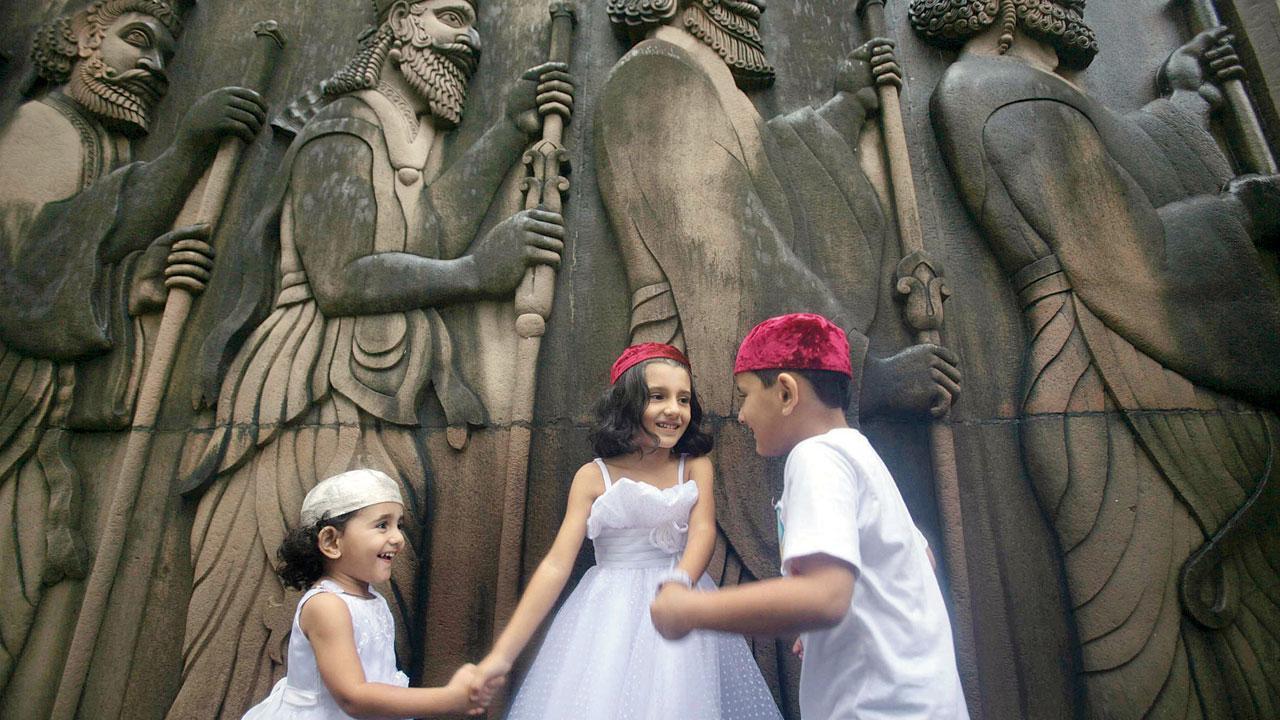
The tradition on Parsi new year is to visit the nearest fire temple before the family gets together for a feast at home, enjoying the community’s iconic dishes. Pic/Getty Images
Every 15 days, Nevil Kika gets into his Chevrolet Enjoy in Navsari and drives 265 km to get to Mumbai. His car is loaded with Parsi goodies, cooked by wife Rashna, for doorstep deliveries in the community nooks of Behram Baug, Bharucha Baug, Panthaki Baug, Dadar Parsi Colony, Cusrow Baug, Tata Block, Godrej Baug, and a few homes in Bandra. With zero delivery charge—It’s love and fondness for customers from their community that fuels the Kikas to bring dar-ni-pori, mawa pori, patrel, bhakhra, kopra pak, mitthi puri, chapat, and homemade pickles, all neatly packed, to those addicted to the taste. Trip dates and the menu are announced on WhatsApp, and that’s where orders are taken.
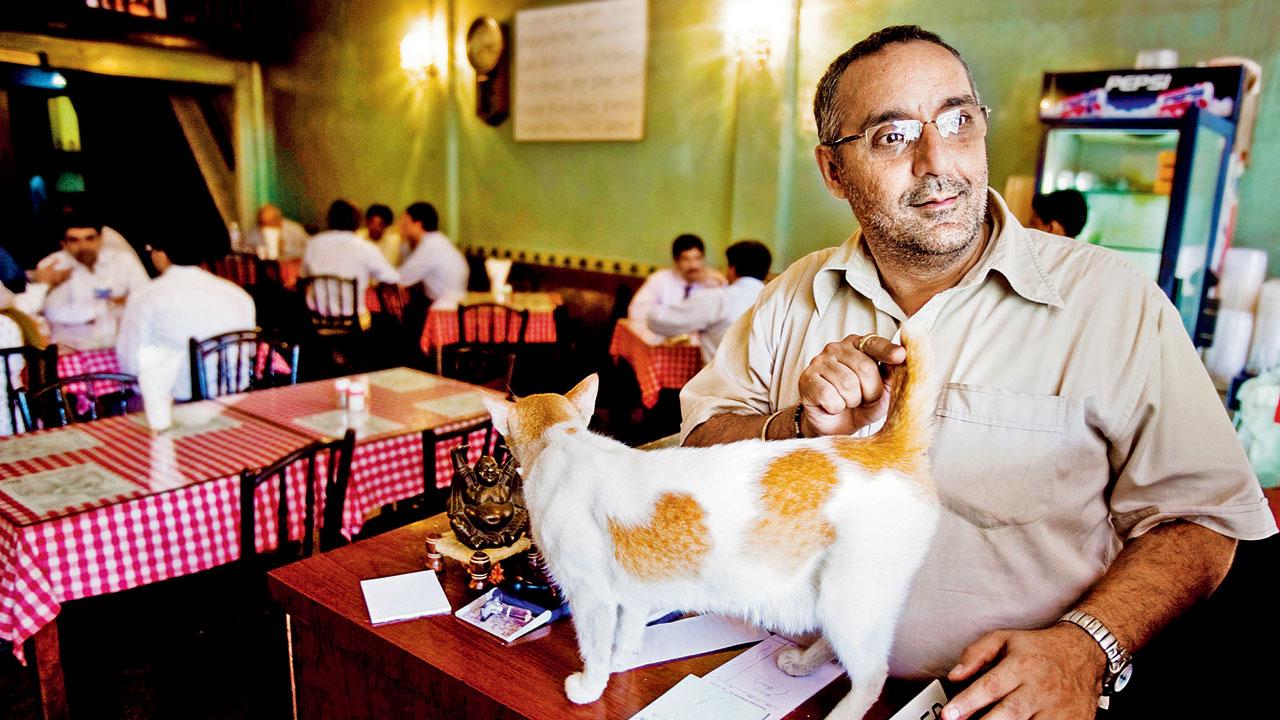
Masterchef India contestant, Danishii Bhagat from Hyderabad, says when in Mumbai, she likes dropping in to the city’s two favourite and famous Parsi eateries: Jimmy Boy at Horniman Circle offers lagan-nu-bhonu (wedding feast)
Breaking language barriers, mid-day got on a phone call with Rashna. She spoke in Gujarati, we, in English; her daughter Tanisha, a baker, came to our rescue when we had trouble translating. Born in Sara village of Vansda Taluka, Navsari district and raised in Golvad and Surat, the Kikas have been living in Navsari since 2002. Rashna began catering Parsi delicacies in 2015. The word spread like salli, and orders began flowing in from as far as Mumbai. At first, Nevil travelled by train, but during COVID, when orders did not slow down, he started driving across the state to come to Maharashtra.
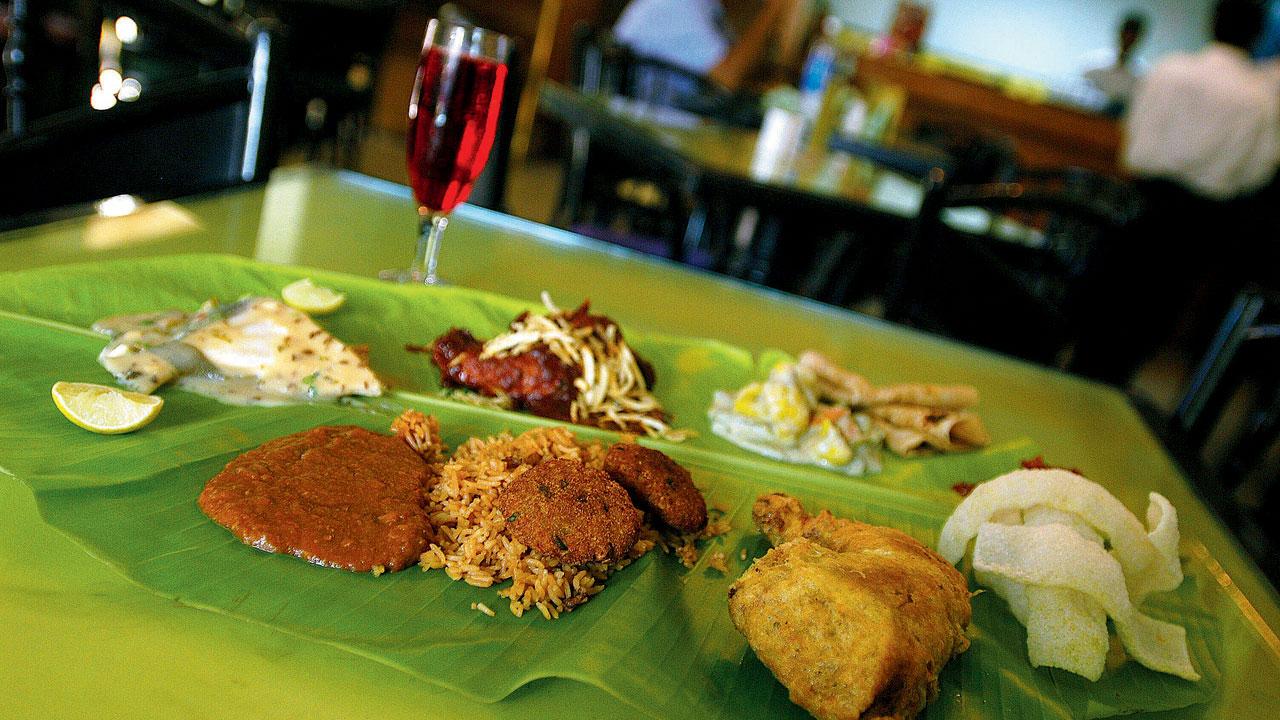
A banana leaf and Britannia & Co. for berry pulao-dar and salli boti
Rashna’s favourite dishes—dhansak, curry rice, chicken farcha, patra-ni-macchi, lagan-nu-custard, and Tarapori patio—are a hit. A devout Zoroastrian, on Parsi new year, the family’s day starts with a visit to Pak Anujuman Navsari Atash Behram in Tarota Bazaar. “We meet and greet our friends and family, come home to present sagan-na-envelope [gift money] to the children with good wishes, and have homemade sev and dahi for breakfast,” says Rashna. And then starts the busy day of sending off orders. The family gets together with friends over a hearty lunch of dhan dar and fish patio with homemade gajar-mewa nu achaar. “In the evening,” she continues, “we catch a Parsi natak [play] at the Tata Auditorium and come home to drinks and a dinner of salli boti, mutton pulao dal, and lagan-nu-custard. This is how we start the new year each time, making good memories.”
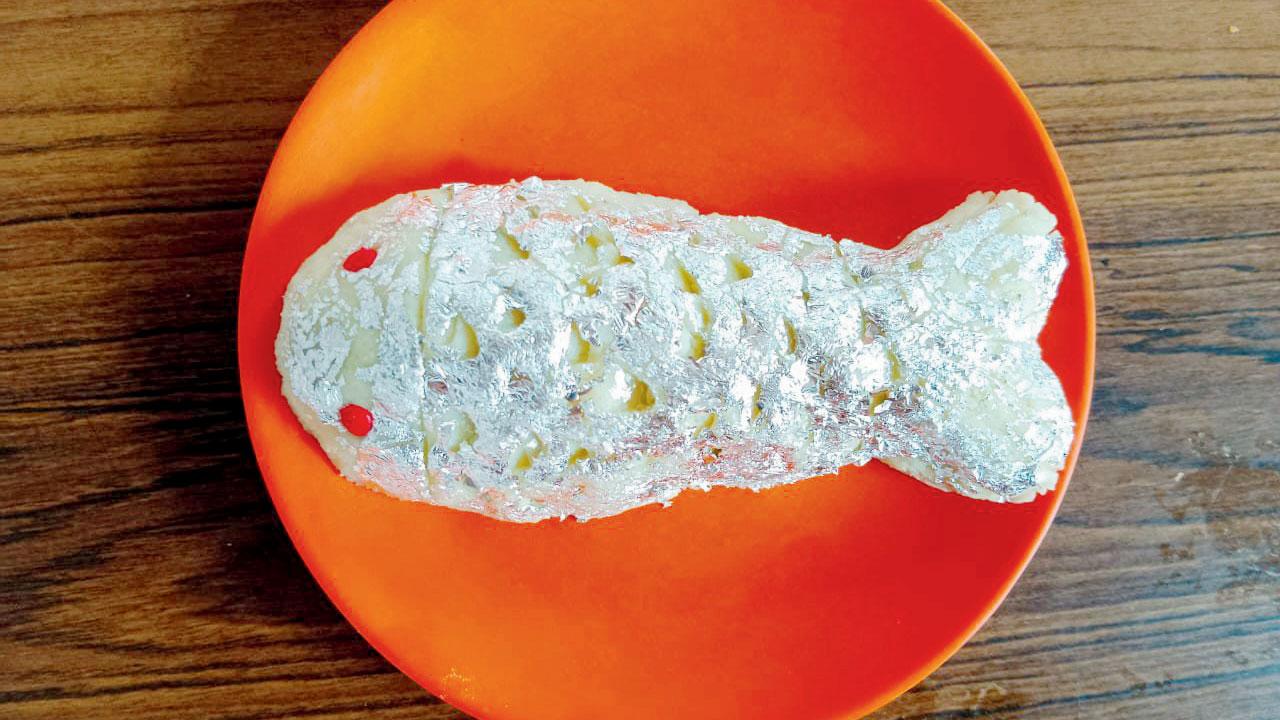 Mawa Boi
Mawa Boi
When Dilnawaz Karkaria moved to Bengaluru from Nagpur to pursue academics, she kept missing her favourite mutton pulao dal. Back home, her father worked at Empress Mills and they lived in the company quarters where there was a fire temple and a strong sense of community. Realising there aren’t too many Parsi food options in Bengaluru, Karkaria began cooking and catering in 2009, and the chicken Russian pattice, mutton dhansak, chicken farcha, prawn pulao dal, and dal-ni-pori are now huge hits, especially at Navroz. Married to Fardoon Karkaria, the Panthaky (priest) of Dar-e-Meher in Bengaluru, the Karkarias live in an apartment not far from the fire temple on Queen’s Road. Karkaria’s sister, aunt and cousins live in Mumbai, and she visits them once a year. When here, she never misses going to B Merwan & Co, a Zoroastrian-run bakery opposite Grant Road station for a breakfast of mawa cake and chai.
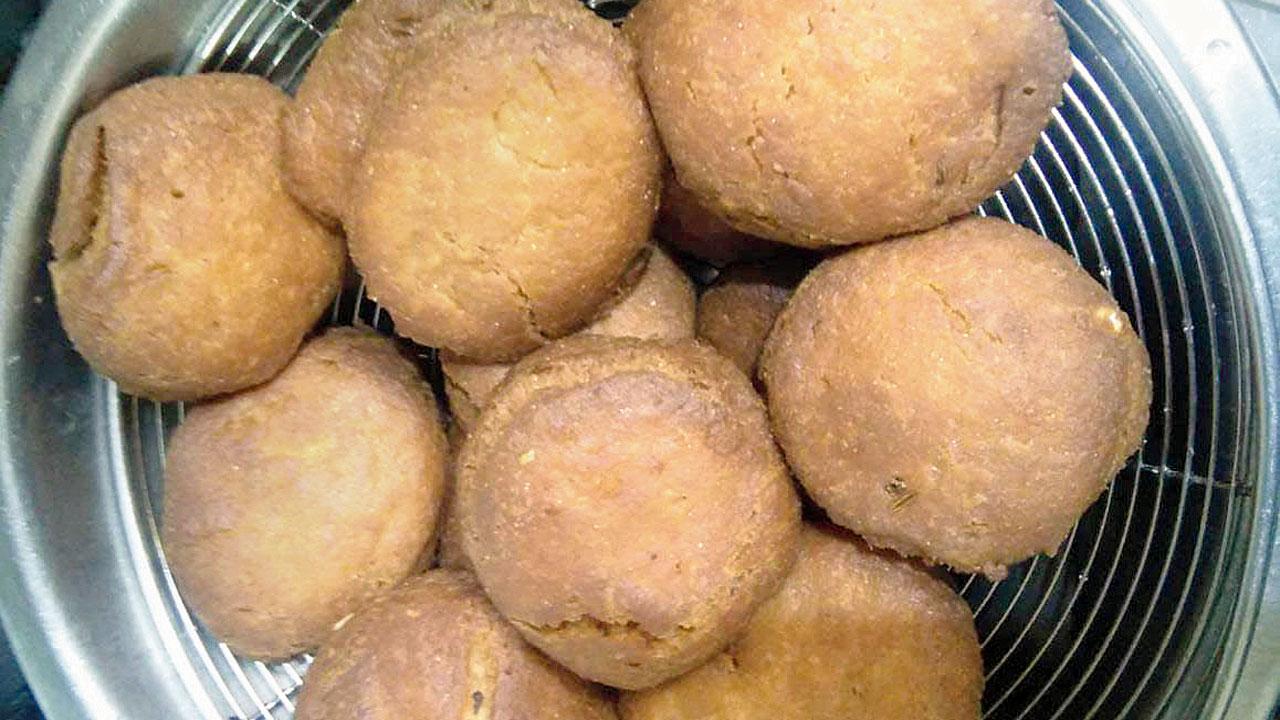
Bhakra
On Parsi New Year, early in the morning, Karkaria heads to the agiary to put the chalk (rangoli) on the veranda, something she truly enjoys. Then she comes home to get ready for prayers at the agiary at around 6.30 am. “A maachi [flower veil] is offered by our family on the morning of navroz. Then we come home for sev or ravo, and breakfast. Later, around 10.30 am, we have a jashan ceremony performed by the priests. People come to attend it and offer prayers, and once done, we greet each other ‘Navroz mubarak!’
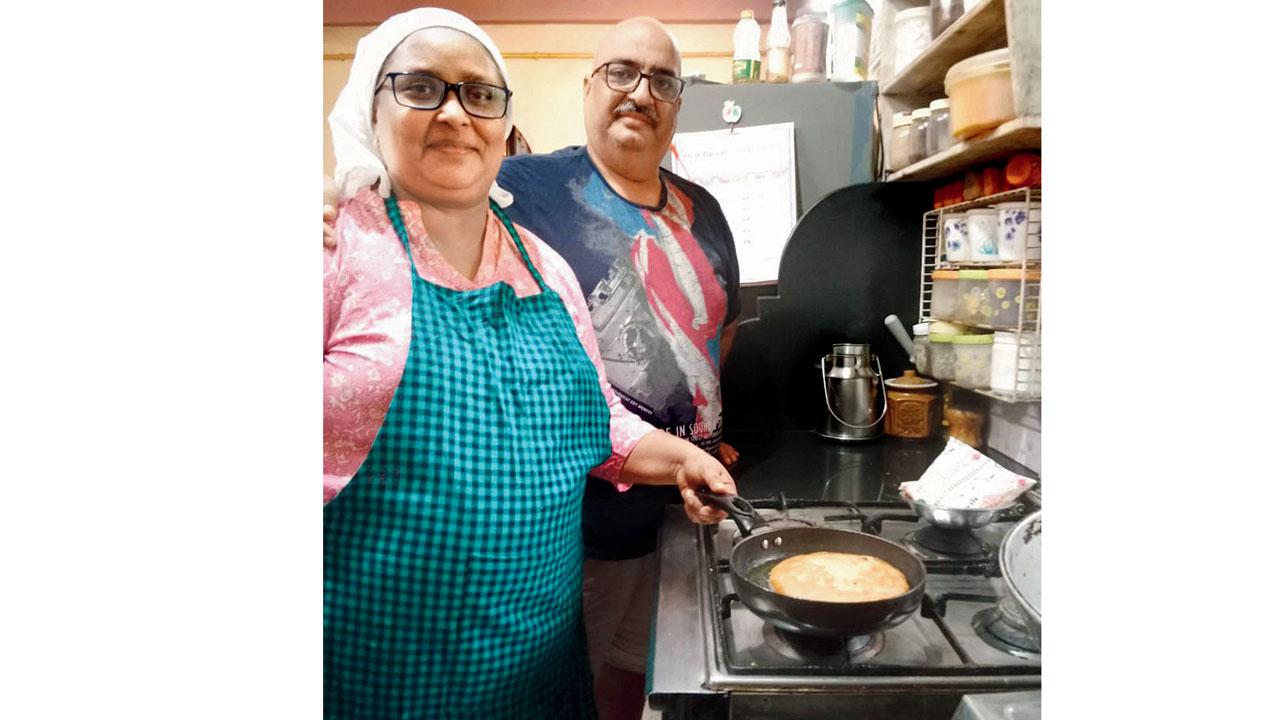
Rashna and Nevil Kika making dar-ni-pori at their Navsari home
Then everyone goes home to a lunch of dhan-dar-patio or pulao dal and siesta. We are back in the agiary later as some people come in the evening to pray, and there’s a community gathering at the hall where we enjoy a round of entertainment,” she narrates. There are around 700 Parsi families in Bengaluru and although, spread across the city, they come together to celebrate festivals, Dilnawaz adds.
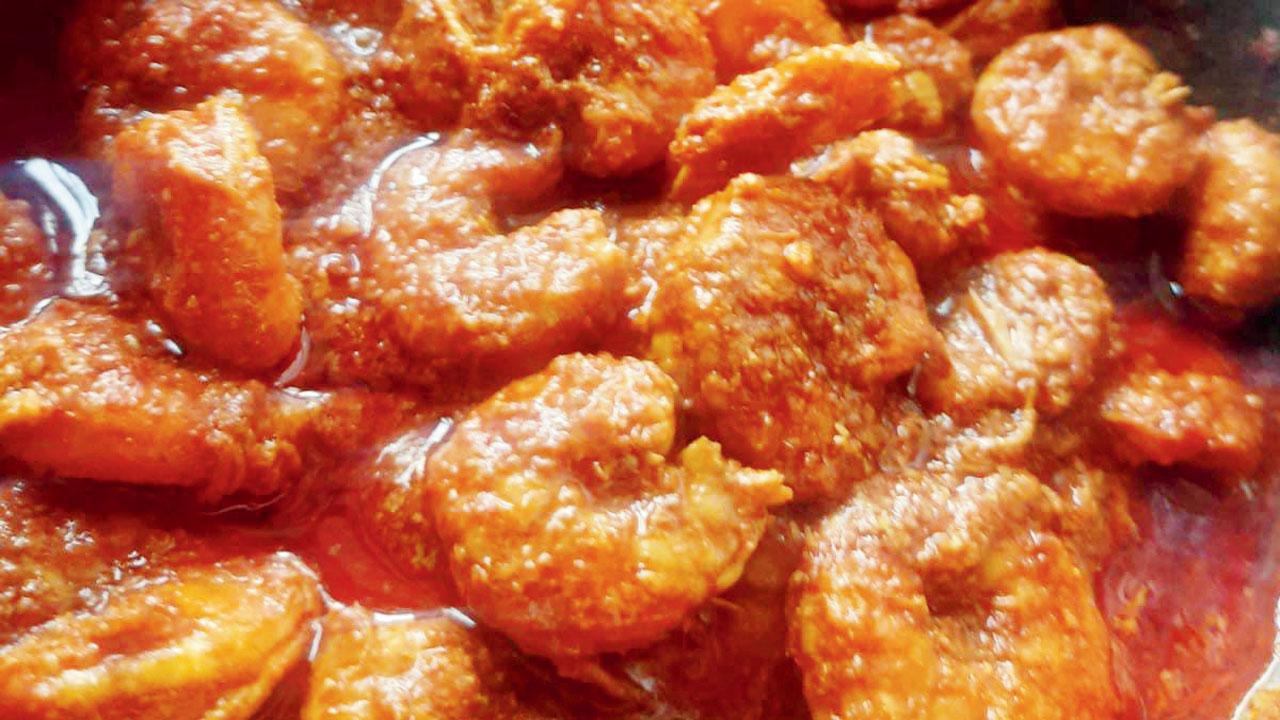
Kolmi
A former Masterchef India contestant in seasons 5 and 6, where she was one among top 60 and top 40 in India respectively, Danishi Bhagat was raised in Hyderabad. She started cooking when she was just nine. “Always fascinated with food and how it works, my mom and grandma encouraged me, and my love for food kept growing. I’ve been cooking Parsi food ever since I learnt how to cook. My grandma is my inspiration. Nobody can match her level [of skill] at cooking Parsi food,” says Bhagat. In both seasons of the reality show, she cooked Parsi dishes such as dhansak and caramel custard, and that’s when her friends circle started asking about the cuisine and the culture. So she curated a tastng menu. “There are quite a few favourites, but fish-saas and khichdi, kolmi-no-patio, patra -ni-macchi, the most famous mutton dhansak, chicken farcha and caramel custard are a hit.”
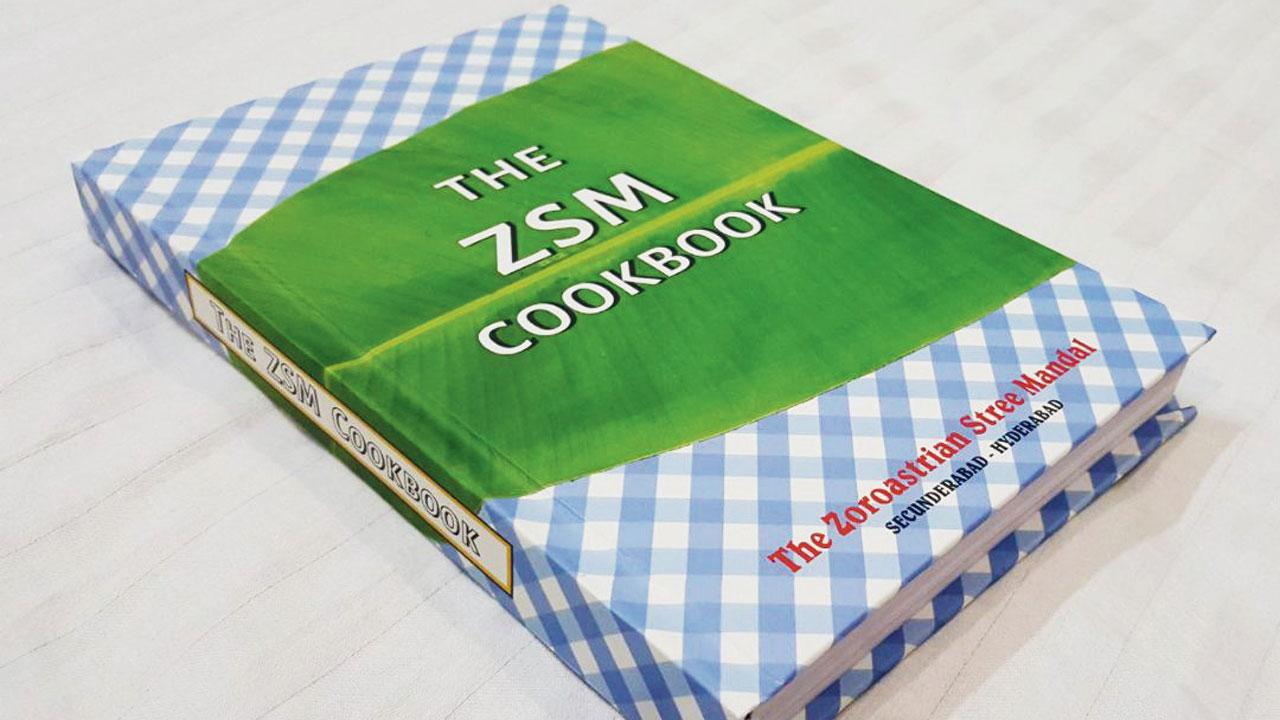
Before Navroz, the community observes muktad for 10 days beginning from August 5. Families gather in fire temples to remember the dearly departed, and thank their ancestors. “During these 10 days, we arrange flowers in vases for the departed souls,” says Bhagat. “On New Year’s day, we usually visit the three fire temples in Hyderabad. This year, the community plans to celebrate with pomp and show as we had a low-key affair in the last two years due to COVID.
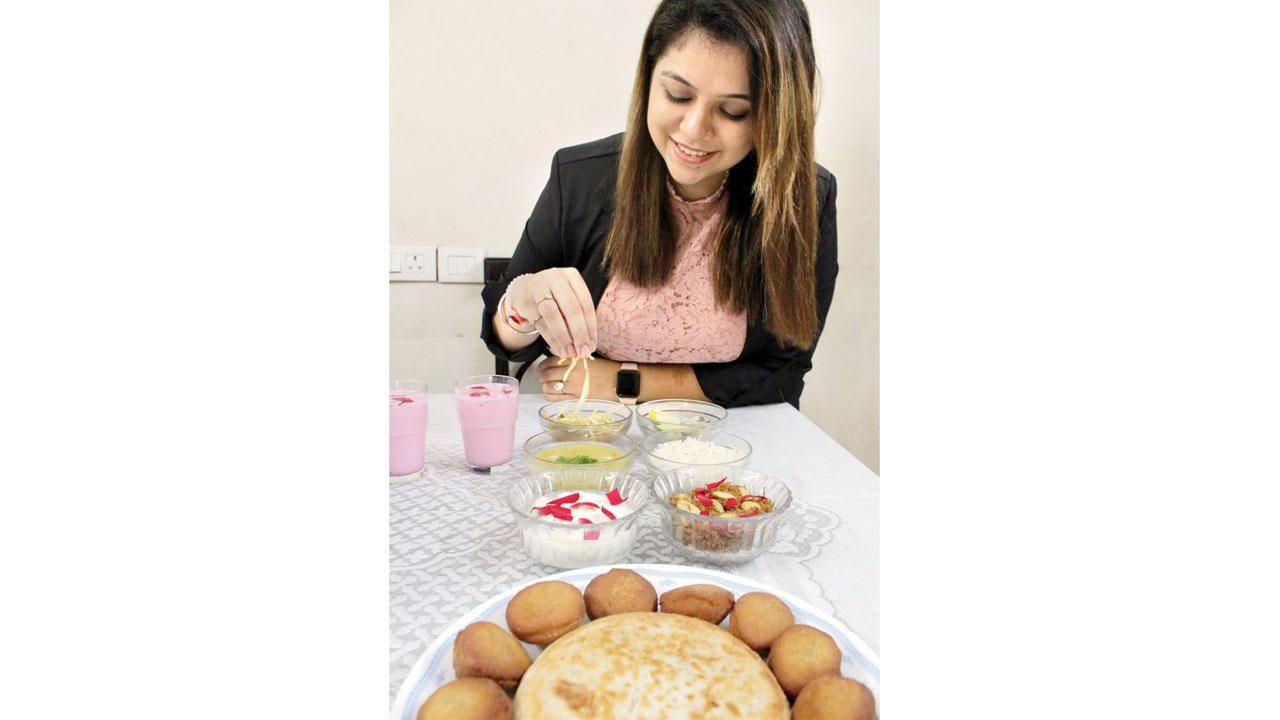
Danishi Bhagat was inspired by her grandmother and began cooking when she was nine
Also, as per the Zoroastrian calendar, this year marks the 175th anniversary of Seth Viccaji-Seth Pestonji Meherji Fire Temple at MG Road in Secunderabad. We meet friends and family over lunch, and dinner is usually with family or in the Zoroastrian club over a spread of Parsi delicacies. Mornings, after prayers, are spent at my grandmom’s house where we drink the Parsi falooda with enjoy mitthoo dahi [sweet curd] and ravo [sweet semolina pudding] or sev.”
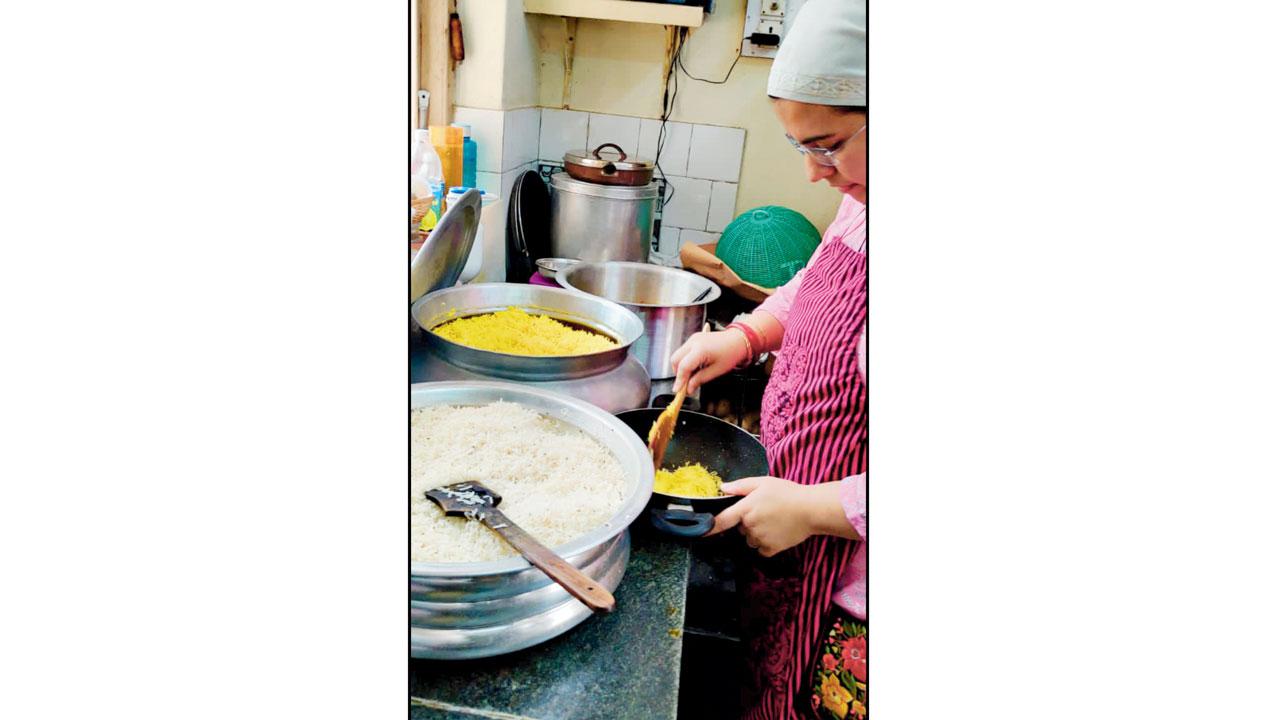
Dilnawaz Karkaria has been making Parsi food in Bengaluru since 2009
A part of Bhagat’s family lives in Mumbai in Godrej Baug and Malabar Hill. She visits them twice a year, especially her aunt. “I love the Parsi fire temple in Tardeo—it’s beautiful and peaceful; so is the one in Malabar Hill—amazing view from the top. I love eating at Britannia and Co, Jimmy Boy and B Merwan and Co. As Hyderabad does not have any good Parsi food places, apart from SodaBottleOpenerWala, I do wish to start an authentic Parsi cafe in the city, for a glimpse into the community’s joie de vivre, and of course, great food.”
Kolmi no patio (Prawn relish)
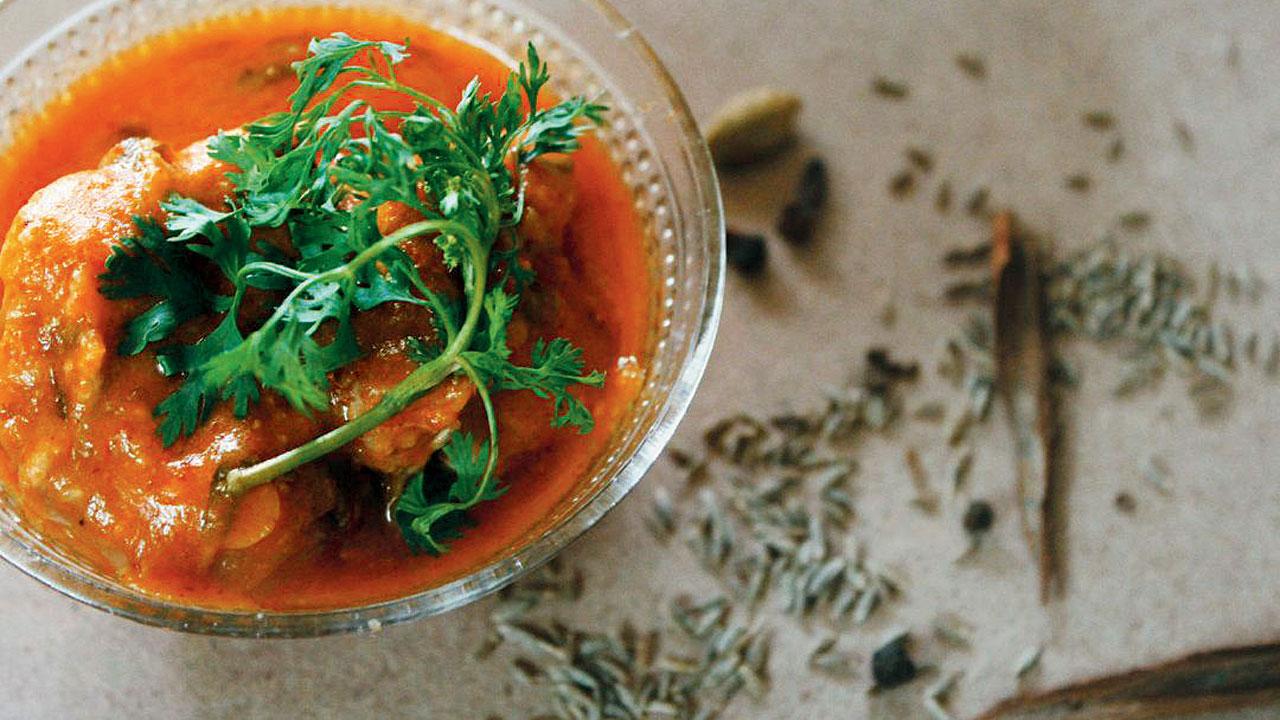
Ingredients
500 gm prawns, shelled, deveined
2 onions, chopped
2 tomatoes, chopped
2 tsp tamarind paste
1 tsp coriander powder
1 tsp cumin powder
1 tsp chilli powder
1/2 tsp turmeric powder
1 tsp garam masala powder
1 tbsp jaggery, grated
1 tsp lime juice
Salt to taste
1/2 cup prawn stock
4 tbsp coriander leaves, chopped
Ground to a fine paste:
6-8 dry red chillies (adjust to suit your heat tolerance)
7 garlic cloves
1/2 inch ginger
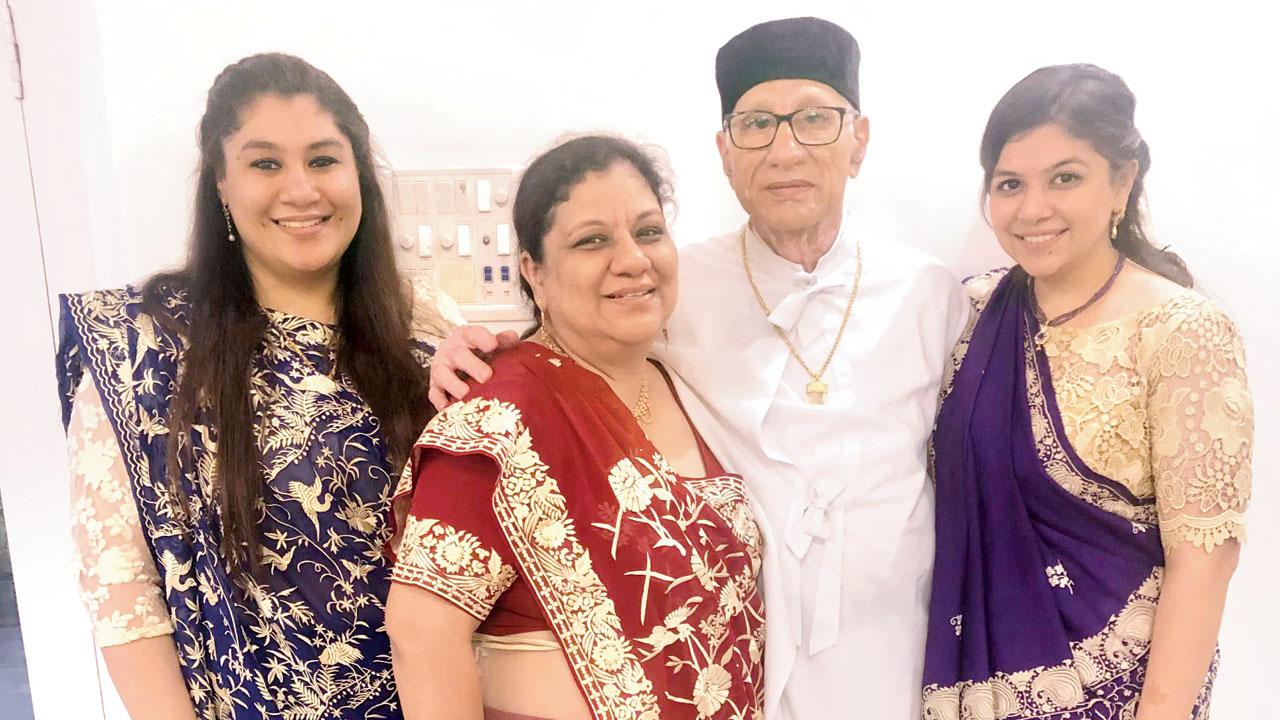
Bhagat with her family in Hyderabad
Method
Rinse a handful of prawns and boil them in two cups of water. Switch off the heat, strain the liquid and discard the prawn shells. Take 1/4 cup of the stock and soak chillies in it for 10 minutes. Grind the chillies, ginger and garlic with the stock to get a smooth, fine paste. Keep aside. Dilute tamarind paste in some prawn stock. Keep aside. Heat oil in a pan, and saute the chopped onion until it turns golden. Add the ground chilli paste and stir fry for a minute or two, till the raw smell goes off.
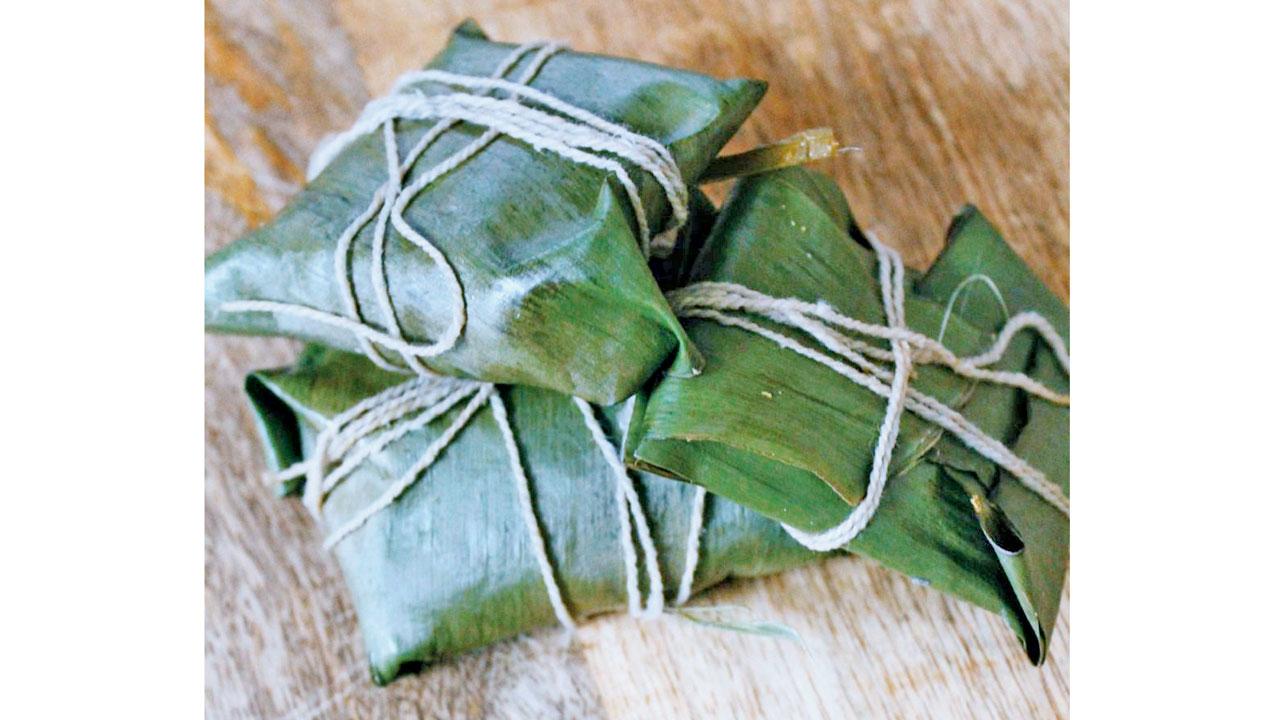
Patra-ni-macchi
Add the coriander, cumin, chilli, turmeric and garam masala powders and mix well. Tip in the chopped tomatoes and cook till oil separates. Add tamarind water and jaggery, and mix well. Bring to a boil. Now, slip the prawns into the mixture and mix well. Once they cook, add lime juice and chopped coriander leaves. Serve hot with dhan-dar (steamed rice and yellow toor dal) or chokha-ni-rotli (rice chapatis).
Price: Rs 350
To Order: 9849770066
 Subscribe today by clicking the link and stay updated with the latest news!" Click here!
Subscribe today by clicking the link and stay updated with the latest news!" Click here!








